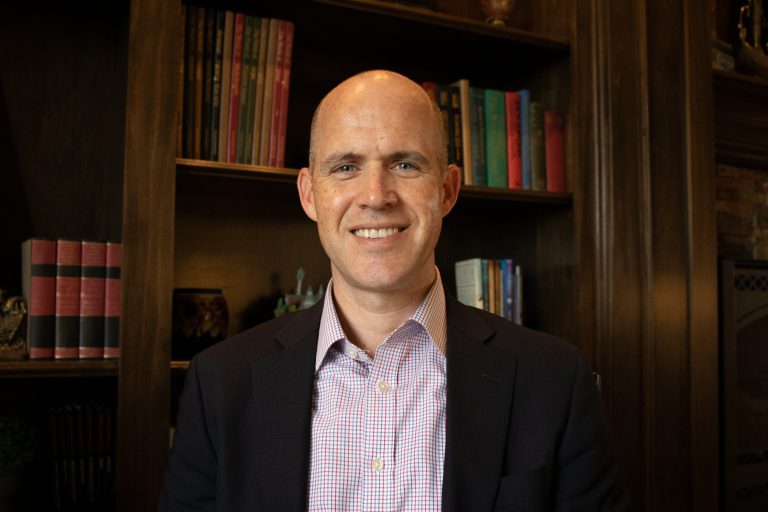After being appointed as Asbury University’s 18th president, Dr. Kevin Brown addressed campus during the first chapel of the year on Aug. 19 and spoke passionately about living “the good life” abundantly through Jesus. In an interview with the Asbury Collegian, he shared his vision for such abundant life for both the University and its students.
Previously the associate dean of Asbury’s Howard and Dayton Beverly School of Business, Brown brings a variety of experiences and academic knowledge to the school’s leadership. He told the Asbury Collegian in a video interview that he is honored and humbled to serve as president.
“I have a strange background as it relates to a path towards education, and certainly a path towards administration within education,” Brown said. Originally from Louisville, Kentucky, he comes from a family of educators. “I was the only person in my family who went into business.”
Brown graduated from the University of Indianapolis with a bachelor’s degree and then a Master of Business Administration. He later received his Master of Letters in Theology from St. Andrews University in Scotland. Three years later, Brown completed a Ph.D. in urban economics and political philosophy at the University of Glasgow.
After working in the banking business for almost a decade, including serving as market president for Wells Fargo Bank, Brown wanted to teach higher education. He came to Asbury in 2013 as a business professor and quickly became a favorite among students. He won the 2016 Francis White Ewbank Excellence in Teaching Award, which students give to one faculty member per year. He has also consistently contributed to the academic world by writing a number of books and serving on panels and committees to help advance Asbury’s mission.
“I always had some sense I would like to get into administration; the ‘what’ and the ‘when’ were not clear to me,” Brown said.
Brown expressed that his main goal for the presidency is continuing Asbury’s primary mission: pursuing academic excellence and spiritual vitality.
“Anytime I have the opportunity to partner with others towards a common vision and mission, that’s something that’s very exciting,” he said.
He explained what he believes the best education looks like, which involves innovation, experience, and interdisciplinary studies. He thinks of education as formation of the person, rather than only information.
“We’ve used students as these receptacles that we just populate with information and move them down some assembly line and credential them. I don’t think that model [is] going to work at all for the future of education,” he said.
“[W]e’re in a really interesting moment right now where there have been a lot of these larger external pivots within the economy, social changes, political changes, technological changes, and so we ask the question, ‘What does it mean to be a university and to fulfill our mission in this present moment?’” he continued.
Brown wants to overcome the perceived narrative that a liberal arts education leaves graduates working in minimum wage jobs saddled with debt. He believes that a wide range of studies is the best way to equip students for the job market.
“It’s just a much different market, a market that prizes creativity, that prizes innovation, that prizes collaboration, communication, judgment, quick decision-making, folks that have a service orientation,” he said. “These are important values we need to have.”
And while methods of teaching higher education may change to fit the demands of the market, the missional values of Asbury as a university remain the same.
Brown said that his favorite part of Asbury is the communal spirit among everyone, and he wants to foster it. “When I think of what was so important to me in my college experience, it wasn’t simply what I learned,” he said. “It was that men and women invested in me and changed the trajectory of my life forever.”




